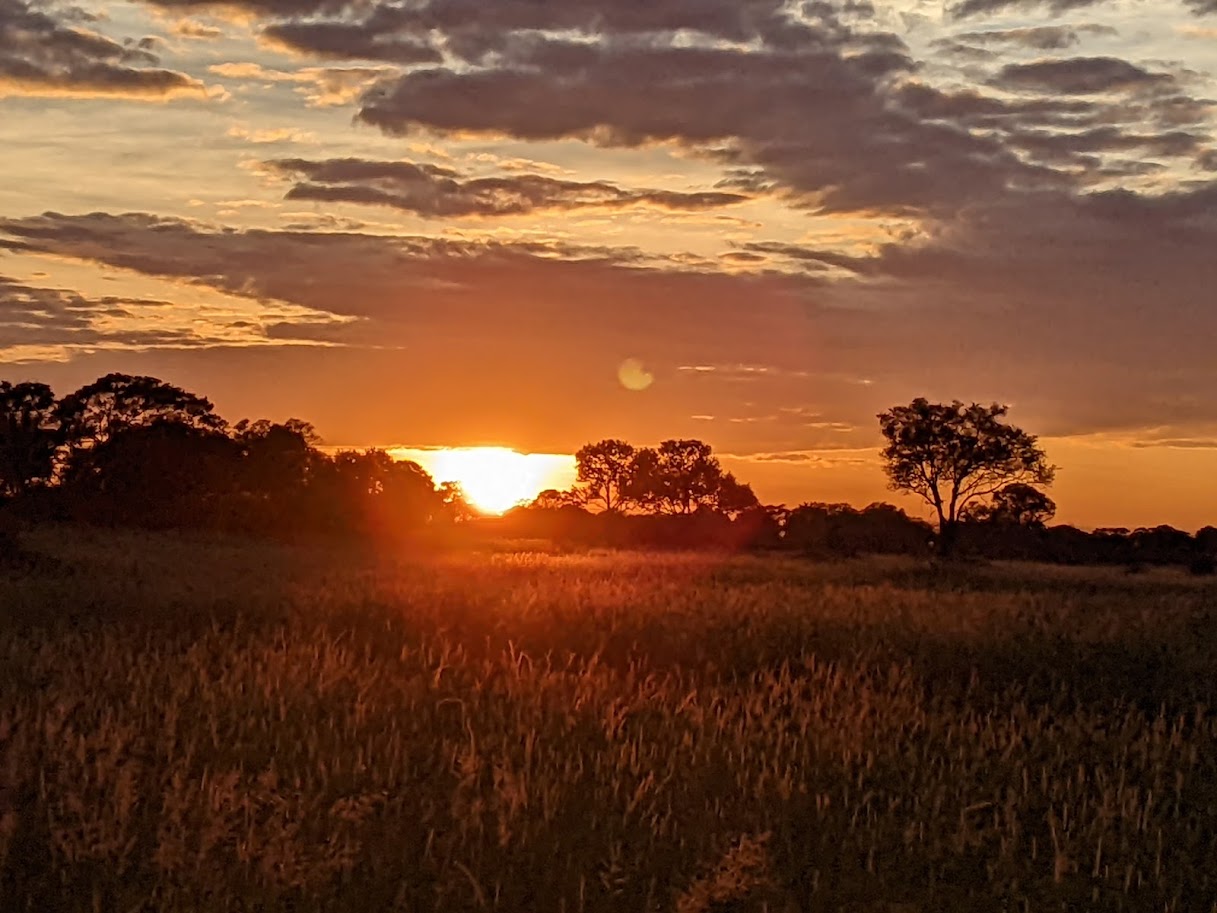
For the first time this trip, I have company on my game drives; fellow guests who came here for the same experience as me. I really like it. There’s certainly something that feels privileged about having the whole production to myself, but it’s lonely too. Both the Swiss couple and the South African couple (I won’t use their names because I haven’t asked them if I may) are lovely people, and we’ve been having a great time going around together. We’ve even talked, semi-seriously and semi-joking, about traveling together in the future. It probably won’t happen, logistics being what they are, but I would like it very much if it does.

Lions roared around our camp all last night, and it was very shortly into the morning game drive when we found one. In fact we found two — both of them clearly visible, unlike last night. We first found one male we didn’t know; and then Gray-snout from last night joined him, and they washed each other happily for a while. TJ explained that they were two out of a coalition of five brothers who all collectively ruled this area. They each mated with all the pride’s females, and therefore each male regarded all the lionesses’ babies as his own. This kept the cubs safe from him, no matter whom the biological father really was, since a male lion would normally kill cubs who weren’t his own.
A herd of impala watched the lions from atop a distant hill. All of a sudden, they all began running away very fast. At first, TJ thought they had just caught the lions’ scent, but he quickly changed his mind, seeing something move in the grass.
“Wild dogs!” he called out, showing us where they were chasing the impala. “One… two… three… four…”
That fourth settled it that this was a different, and larger, pack from the one we had seen my first night at Splash Camp. We left the lions — who were acting lazy enough to make TJ believe they would probably be there for a long time — to follow the dogs.

And “follow” turned out to be the correct term. The dogs quickly caught the scent of the lions and abandoned the impala hunt, the alpha pair no doubt deciding they had more important things to worry about. That particular pride of lions had killed one member of this pack of dogs several months ago, and the dogs clearly remembered. With admirable discipline, they lined up to move out, and their leaders took them on their way.
Another vehicle was coming from the sister camp, and it contained wild dog enthusiasts. So, for their sake, we tried super hard to keep up with the dogs. We moved around to the front of where they were headed several times, hoping they’d decide to settle down, but they kept going. It was a wild ride — the safari vehicle ran right over several bushes and once knocked down a small tree (of a species which bounced right back up in our wake, fortunately). Eventually we lost the dogs in a patch of bush that was too thick for even TJ to drive through. All we could do was to tell the other vehicle where the dogs had been when we last saw them, and hope they would be able to find them again from there.
After the dogs, things were fairly quiet till we got to the pond where we were to have our Mokoro rides.
A Mokoro is a traditional Delta flat-bottomed canoe. Like a Venetian gondola, the passengers sit on seats in the basin of the boat, while the boatman stands behind them and poles the boat along. Our guides were our boatmen. A maximum of two people can sit in any given Mokoro, so TJ poled me, KP poled one of the couples, and a guide borrowed from the sister camp for the morning poled the final pair.

Most ponds in this area are transient. They can be the temporary creations of the rainy season, when a hole made by elephants or hippos fills up with rain water (and therefore attracts more elephants and hippos). Or they can be the equally temporary creation of the Delta floodwaters, when the maximal load of high water comes roaring down from Angola and the entire Delta fills up with liquid, while the high ground turns into islands.
This was an exception. The pond was fed by a year-round channel from the river, so it remained a year-round pond. That led to a staggering accumulation of life within it: water lilies with broad lily pads, fish, water skaters, frogs — and of course, at least sometimes, hippos and crocodiles. Our guides did their best to inspect it for hippos and crocodiles, before they let us go out. Even though they found none, they stuck to poling us around the edges of the pond, in the shallow water, just in case.

Because the Mokoro is flat-bottomed, it can afford to move in very little water. We glided smoothly along without incident, even when the bottom was only a couple of inches away. TJ told me about the wildlife we were passing, from the malachite kingfisher (I didn’t get a picture because it flew away before I could get out my camera, but it was beautiful) to a tiny green frog no longer than my thumbnail, who was living on a slender reed the same color as he was. TJ explained that these nocturnal frogs hide in plain sight by day, to keep from being eaten by birds of prey and similar dangers. It was certainly hard to see against the reed! I’m not sure if I would spotted him without TJ to tell me where to look. When I did see him, he was adorable, and I held him on his reed for a little while before returning him to the water.
We finished the Mokoro ride and climbed out of our boats — right around the time KP found evidence that the pool had a resident hippo after all. I’m not sure what exactly he found, but it gave KP the willies. KP doesn’t like poling a somewhat unstable boat in a pond with a hippo, especially when he hadn’t known he was doing it. But we all made it back safely.
So, since I have brought them up: how DO you dodge a hippo? On the afternoon riverboat trip, I was about to find out.
Our group did a boat trip this afternoon, instead of a full game drive. Like the Mokoro ride, it didn’t completely pre-empt the game drive; nothing completely pre-empts game drives at Splash Camp. This is partly because nothing is considered more important here than the wildlife, but there’s also a practical element to it. When you go to the airport, or are picked up from it on arrival, it happens in a safari vehicle and you look for game on your way. I had wondered about this at the beginning — Old Drift has safari vehicles but also regular vans for transport work — until I realized that there are absolutely no paved roads in the Delta. Not even the road to Maun, the Delta’s one real town. Anyplace you’re going to go will be the same kind of off-road driving that the safari vehicles are made for… and that ordinary cars and vans decidedly aren’t. Without the powerful traction of the safari vehicles, you’d probably get stuck in the mud. Since every ride anywhere is going to be a careening adventure through safari-land, why not embrace it? That’s how I found a tsessabe antelope and a steenbok on my way from the airstrip, after all.
So we took the safari vehicle to the river, which is technically in the Moremi Game Preserve, a public park. We all climbed into an aluminum motorboat with a very limited sun shade and set out for the river. It was a beautiful place, but with the sun coming in low from the west — the side of the boat I was sitting on — the sun shade directly overhead gave me no protection at all, and since I still can’t use my sunscreen because I think it’s what caused the awful rash on my hands and arms, I had to hide the right side of my face and arm under my jacket.
TJ explained to us that you had to be very careful going around hippos in the river. They are extremely foul-tempered, and even more territorial; if you bring your boat into their space, you will regret it. So you have to dodge them.

First, you must identify your hippo. This is not as easy as it sounds. Hippos can stay underwater for several minutes at a time, and often do. It takes less than a minute to pass a given point in the river from where you first see it, so identifying the presence of a hippo isn’t always easy. TJ does it by looking for ripples that have no other reason to be there… but because that river has a significant current causing all sorts of eddies and ripples, I couldn’t tell the current from the hippos, myself.

Once you have determined the presence of a hippo, you back up. Quickly. Remember what I said about giving hippos their space? But you have to get past it somehow, so from a point well behind the hippo you start your engine, and you go blasting right by the hippo, moving as fast as your boat will go.
You may not annoy the hippo this way, if it doesn’t really notice you that much. Or if you do annoy it, at least you will be a good distance downriver by the time it figures out that it’s mad at you.

We safely sailed quite a distance this way, and then realized that it was already 6:30 and we had to be out of the park by 7:00. There were curfew rules in the public parks. So we turned around and did the whole trip back at full speed, hippo-dodging and all. Several of them popped out of the water in our wake, looking very confused as we waved back at them gaily. I liked this return to a lot better than I had liked the forward route… by this time, the sun had gone down far enough that I could stop hiding under my jacket, and just enjoy whizzing upstream at speed. It was a lot of fun.
I skipped dinner again to go to bed. My meals seem to be stabilizing as brunch, tea, and the snacks we get on the morning and evening game drives. It’s enough to cope, though; at least for three days. I need sleep more than I need much food.

Coming up: harsh lessons from the natural world. What will the Delta show us tomorrow?


Leave a Reply